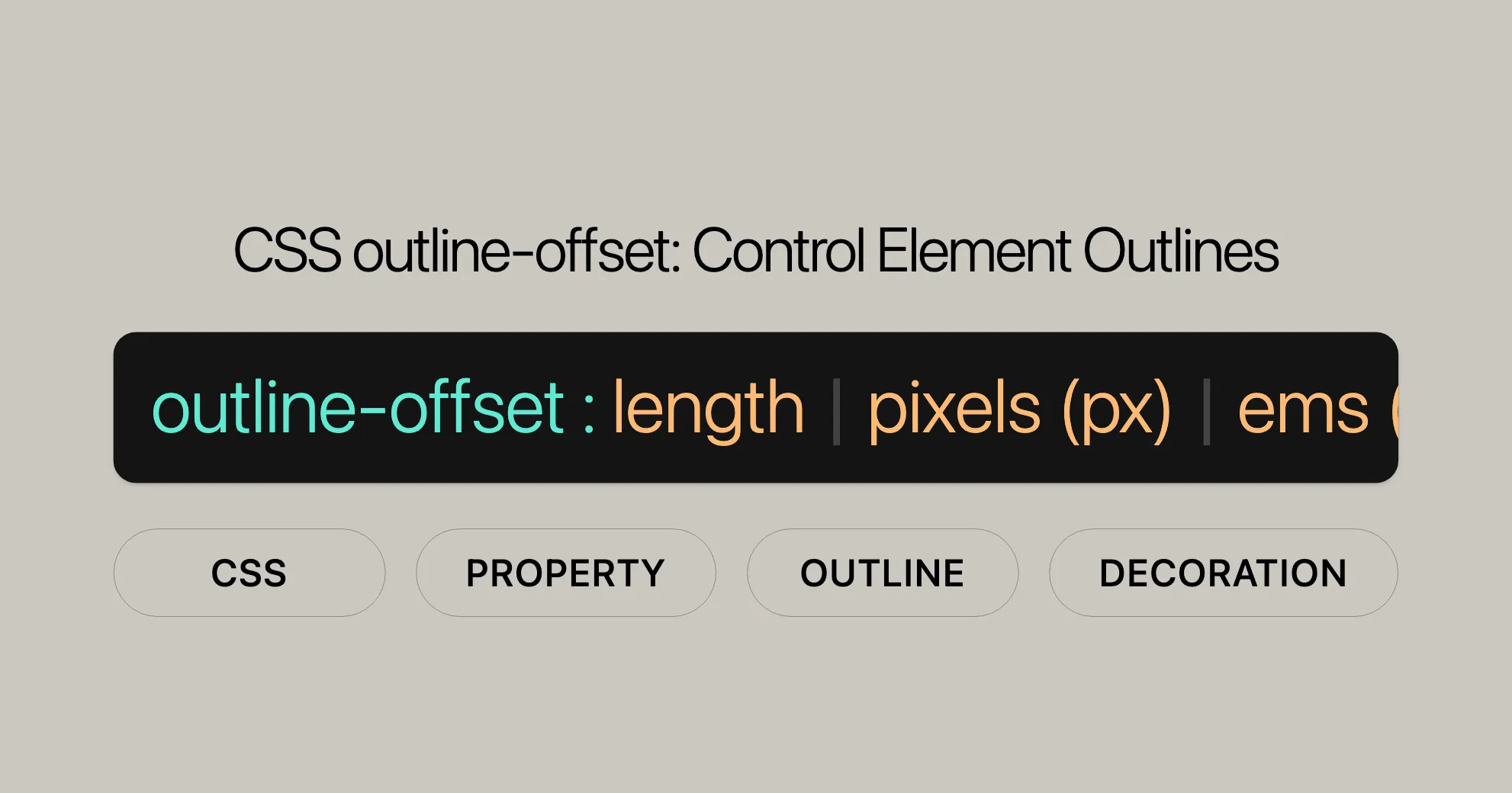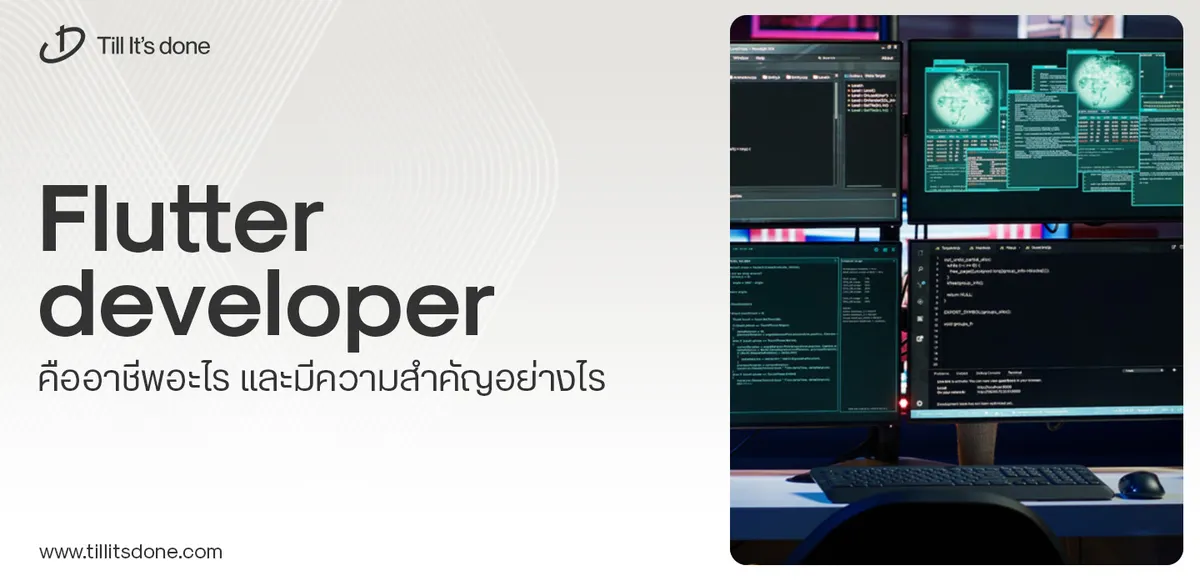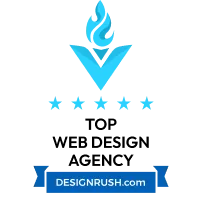- Services
- Case Studies
- Technologies
- NextJs development
- Flutter development
- NodeJs development
- ReactJs development
- About
- Contact
- Tools
- Blogs
- FAQ
CSS outline-offset Control Element Outlines
Use it for focus indicators and decorative purposes.
Set with pixels, ems, or percentages.

Introduction
The outline-offset property in CSS is a handy tool for controlling the space between an element’s outline and its border. It’s great for enhancing the visual appeal and user experience of your web designs without affecting the page layout.
Specification
The outline-offset property is part of the CSS Basic User Interface Module Level 4. This module provides properties and values for controlling the user interface aspects of web elements, including outlines and their offsets.
Description
The outline-offset property specifies the space between an element’s outline and its border. Unlike borders, outlines don’t affect the layout of the page and can overlap other elements. This makes them ideal for focus indicators and decorative purposes.
Syntax
The syntax for the outline-offset property is straightforward:
outline-offset: <length>;Where <length> can be any valid CSS length value like pixels (px), ems (em), or other units. You can also use global CSS values like inherit, initial, revert, revert-layer, and unset.
Values
The primary value for outline-offset is a length, which can be specified in various units:
- Pixels (
px): Specifies the space in pixels. - Ems (
em): Specifies the space relative to the font size of the element. - Percentages (
%): Specifies the space as a percentage of the element’s size.
You can also use negative values to place the outline inside the element:
outline-offset: -5px;A value of 0 means there is no space between the element and its outline:
outline-offset: 0;Global values like inherit, initial, revert, revert-layer, and unset can also be used:
outline-offset: inherit;outline-offset: initial;outline-offset: revert;outline-offset: revert-layer;outline-offset: unset;Formal Definition
- Initial Value: The default value for
outline-offsetis0. - Applies To: All elements.
- Inherited: No.
- Animatable: Yes, as a length.
Examples
Here are some examples to illustrate how outline-offset works:
Setting Outline Offset in Pixels
HTML:
<p>Gallia est omnis divisa in partes tres.</p>CSS:
p { outline: 1px dashed red; outline-offset: 10px; background: yellow; border: 1px solid blue; margin: 15px;}This creates a paragraph with a dashed red outline 10 pixels away from the element’s border.
Using Ems for Outline Offset
HTML:
<div class="example">This is an example with ems.</div>CSS:
.example { outline: 2px solid green; outline-offset: 0.5em; background: lightgray; border: 1px solid black; margin: 20px; padding: 10px;}This creates a div with a solid green outline 0.5em away from the element’s border.
Negative Outline Offset
HTML:
<div class="negative-offset">This is an example with a negative offset.</div>CSS:
.negative-offset { outline: 2px solid purple; outline-offset: -5px; background: lightblue; border: 1px solid darkblue; margin: 20px; padding: 10px;}This creates a div with a solid purple outline 5 pixels inside the element’s border.
Zero Outline Offset
HTML:
<div class="zero-offset">This is an example with zero offset.</div>CSS:
.zero-offset { outline: 2px solid orange; outline-offset: 0; background: lightyellow; border: 1px solid brown; margin: 20px; padding: 10px;}This creates a div with a solid orange outline right next to the element’s border.
Using outline-offset
The outline-offset property is a versatile tool for enhancing the visual appeal of your web designs. Here are some practical tips:
Understanding the Basics
- Default Behavior: By default, the outline is rendered right outside the element’s border.
- Positive and Negative Values: Use positive values to add space between the border and the outline, and negative values to place the outline inside the element.
- Zero Value: A value of
0means no space between the element and its outline.
Practical Applications
- Focus Indicators: Use outlines with offsets for focus indicators to improve accessibility.
- Decorative Purposes: Create visually appealing elements without affecting the page layout.
By using the outline-offset property effectively, you can create visually distinct and user-friendly web designs.
Using Outline and Outline-Offset in CSS
-
Focus Indicators: Outlines help users navigate through interactive elements like buttons, links, and form fields. Adjust
outline-offsetto make these indicators more visible and user-friendly.a:focus {outline: 2px solid blue;outline-offset: 5px;} -
Decorative Elements: Outlines can highlight important sections of your web page. Use
outline-offsetto create visually appealing designs..highlight {outline: 3px dashed red;outline-offset: 10px;} -
Responsive Design: Use relative units like
emorremwithoutline-offsetto make your designs responsive..responsive-outline {outline: 2px solid green;outline-offset: 0.5em;}
Best Practices
- Consistency: Keep your use of outlines and their offsets consistent for a cohesive look.
- Accessibility: Ensure outlines are visible and easy to distinguish, using high-contrast colors and appropriate offsets.
.accessible-outline {outline: 2px solid #000;outline-offset: 5px;}
- Performance: Avoid excessive values or complex styles that could impact performance.
- Testing: Test designs across different browsers and devices for consistent behavior.
Combining Outline and Outline-Offset
HTML:
<div class="custom-outline"> This is an element with a custom outline and offset.</div>CSS:
.custom-outline { border: 1px solid steelblue; outline: 5px solid lightblue; outline-offset: 10px; padding: 25px; margin: 20px; background: lightgray;}Browser Compatibility
The outline-offset property is widely supported across modern browsers:
| Browser | Version | Release Date |
|---|---|---|
| Chrome | 4.0 | Jan 2010 |
| Firefox | 3.5 | Jun 2009 |
| IE/Edge | 15.0 | Apr 2017 |
| Opera | 10.5 | Mar 2010 |
| Safari | 3.1 | Mar 2008 |
See Also
To further enhance your designs, explore these related properties:
- [
outline]WebsiteUrl: Shorthand for setting all outline properties. - [
outline-width]WebsiteUrl: Specifies the width of the outline. - [
outline-style]WebsiteUrl: Specifies the style of the outline. - [
outline-color]WebsiteUrl: Specifies the color of the outline. - [
border]WebsiteUrl: Property for setting the border of an element.
By understanding and using these properties, you can create highly customized and visually appealing web designs.
 Web Developers คืออะไร? สำคัญแค่ไหน Web Developer คืออาชีพที่มีทักษะด้านโปรแกรมมิ่ง และมีการเรียนรู้ในเทคโนโลยีใหม่ ๆ เพื่อพัฒนางานอย่างต่อเนื่อง และมีความสำคัญกับธุรกิจในยุคดิจิตัลแบบนี้เป็นอย่างมาก
Web Developers คืออะไร? สำคัญแค่ไหน Web Developer คืออาชีพที่มีทักษะด้านโปรแกรมมิ่ง และมีการเรียนรู้ในเทคโนโลยีใหม่ ๆ เพื่อพัฒนางานอย่างต่อเนื่อง และมีความสำคัญกับธุรกิจในยุคดิจิตัลแบบนี้เป็นอย่างมาก  จุดเด่นของ React JS คือ ดียังไงกับการทำ Mobile App React JS เป็นไลบรารีที่สนับสนุนการพัฒนาแอปพลิเคชันแบบ Single Page พร้อมรองรับการสร้างแอปบนมือถือด้วย React Native แต่ทำอย่างไร มาดูกันครับ
จุดเด่นของ React JS คือ ดียังไงกับการทำ Mobile App React JS เป็นไลบรารีที่สนับสนุนการพัฒนาแอปพลิเคชันแบบ Single Page พร้อมรองรับการสร้างแอปบนมือถือด้วย React Native แต่ทำอย่างไร มาดูกันครับ  Flutter คืออะไร ฟรีมั้ย การพัฒนาแอปพลิเคชันในยุคดิจิทัลนี้ Flutter ได้กลายเป็นหนึ่งในเครื่องมือที่ได้รับความนิยมอย่างมากในวงการ แล้ว Flutter คืออะไร แล้วใช้งานฟรีหรือไม่?
Flutter คืออะไร ฟรีมั้ย การพัฒนาแอปพลิเคชันในยุคดิจิทัลนี้ Flutter ได้กลายเป็นหนึ่งในเครื่องมือที่ได้รับความนิยมอย่างมากในวงการ แล้ว Flutter คืออะไร แล้วใช้งานฟรีหรือไม่?  อยากสร้าง Mobile App จะเลือกใช้โปรแกรมเขียน Mobile App การเลือกโปรแกรมเขียน Mobile App มีเครื่องมือกับภาษาอะไรให้เลือกใช้งานกันมากมาย ควรพิจารณาอย่างไรเพื่อให้มีประสิทธิภาพและตรงตามความต้องการของโปรเจกต์
อยากสร้าง Mobile App จะเลือกใช้โปรแกรมเขียน Mobile App การเลือกโปรแกรมเขียน Mobile App มีเครื่องมือกับภาษาอะไรให้เลือกใช้งานกันมากมาย ควรพิจารณาอย่างไรเพื่อให้มีประสิทธิภาพและตรงตามความต้องการของโปรเจกต์  Next.js คืออะไร? มาเริ่มเขียนเว็บด้วย Next.js กันดีกว่า Next.js เป็น Framework สำหรับสร้างเว็บไซต์ด้วย React ที่ช่วยให้สามารถสร้างเว็บไซต์ที่มีประสิทธิภาพและใช้งานได้จริง และรองรับ SEO ได้ดีขึ้นอีกด้วย
Next.js คืออะไร? มาเริ่มเขียนเว็บด้วย Next.js กันดีกว่า Next.js เป็น Framework สำหรับสร้างเว็บไซต์ด้วย React ที่ช่วยให้สามารถสร้างเว็บไซต์ที่มีประสิทธิภาพและใช้งานได้จริง และรองรับ SEO ได้ดีขึ้นอีกด้วย  รู้จักกับ บริษัท Software House คืออะไร ทำอะไรบ้าง Software House คือศูนย์บริการที่ครบวงจรในการพัฒนาเทคโนโลยี ช่วยสนับสนุนธุรกิจในยุค 4.0 และสร้างโอกาสใหม่ ๆ ในตลาดการแข่งขันที่มีการเปลี่ยนแปลงอย่างรวดเร็ว
รู้จักกับ บริษัท Software House คืออะไร ทำอะไรบ้าง Software House คือศูนย์บริการที่ครบวงจรในการพัฒนาเทคโนโลยี ช่วยสนับสนุนธุรกิจในยุค 4.0 และสร้างโอกาสใหม่ ๆ ในตลาดการแข่งขันที่มีการเปลี่ยนแปลงอย่างรวดเร็ว Talk with CEO
We'll be right here with you every step of the way.
We'll be here, prepared to commence this promising collaboration.
Whether you're curious about features, warranties, or shopping policies, we provide comprehensive answers to assist you.


